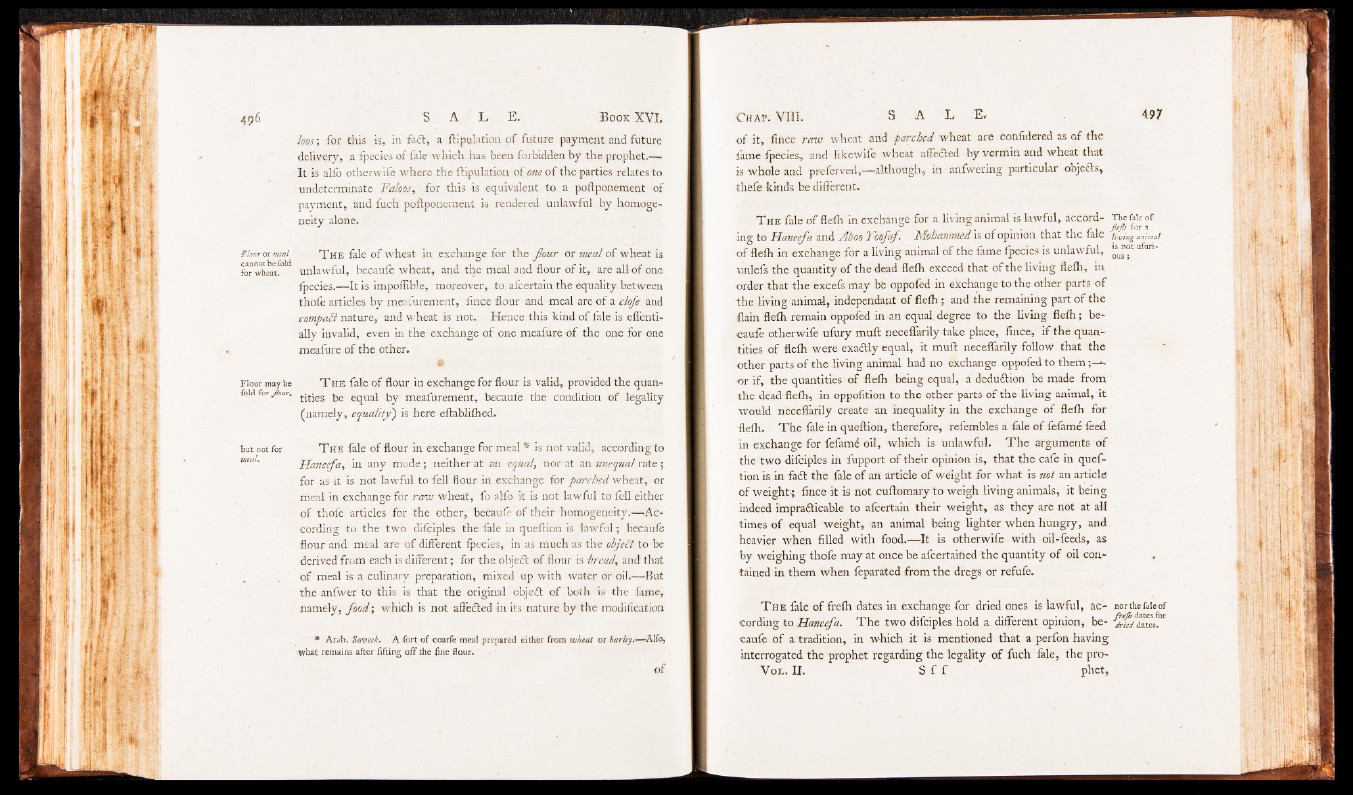
loss; for this is, in fact, a ftipulation of future .payment and future
delivery, a fpecies of fale which has been forbidden by the prophet.—
It is alfo otherwife where the ftipulation of me of the parties relates to
undeterminate Faloos, for this is equivalent to a poftponement of
payment, ’and fuch' poftponement is rendered unlawful by homogeneity
alone.
-Flour or meal T h e fale of wheat in exchange for the flour or meal o f wheat is
for wheae° unlawful, becaufe .wheat, and the meal and flour of it, are all of one
fpecies.— It is impoffible, moreover,, to afcertain the equality between
thofe articles by meafurement, fince flour and meal are of a clofle and
compahl nature, and wheat is not. Hence this kind of fale is eflenti-
ally invalid, even in the exchange o f one meafure of the one for one
meafure of the other.
Floor may be T h e fale of flour in exchange for flour is valid, provided the quanfoldfor
flour., t j t -e s p e e q Uai b y meafurement, becaufe the condition of legality
(namely, equality) is here eftablifhed.
but not for T h e fale of flour in exchange for meal * is not valid; according to
mal' Haneefa, in any mode; neither at an equal, nor at an unequal rate ;
for as it is not lawful to fell flour in exchange for parched wheat, or
■ meal in exchange for raw wheat, fo alfo it is not lawful to fell either
of thofe articles for the other, becaufe of their homogeneity.— According
to the two difciples the fale in queftion is lawful; becaufe
flour and meal are of different fpecies, in as much as the objehl to be
derived from each is different; for the objeft of flour is bread, and that
of meal is a culinary preparation, mixed up with water or oil.— But
•the anfwer to this is that the original objedt of both is the fame,
namely, flood; which is not affected in its nature by the modification
* Arab. Saueek.. A fort o f coarfe meal prepared either from wheat or barley.— Alfo,
w hat remains after fitting o ff the fine dour.
of
of it, fince raw wheat and parched wheat are confidered as of the
■ fame fpecies, and likewiie wheat affected by vermin and wheat that
is whole and prefcrvtul,— although, in anfwering particular objects,
thefe kinds be different.
T h e fale of flefh in exchange for a living animal is lawful, accord- The fale o f
f - . . . . , , , . fltjh fora
ing to Haneefa and Aboo YoofluJ. Mohammed rs of opinion that the I&I6 lining animal
o f flefh in exchange for a living animal of the fame fpecies is unlawful, “u“ 1 u url'
v.nlefs the quantity of the dead flefh exceed that of the living flefh, in
order that the excefs may b6 oppofed in e'xchange to the other parts of
the living animal, independant of flefh ; and the remaining part of the
ïlain flefh remain oppofed in an equal,degree to the living flefh; be*
«câufe otherwife ufury muff neceffarily take place, fince, i f the quantities
of flefh were exadtly equal, it muff neceffarily follow that the
•other parts of the living animal had no exchange oppofed to them .
■ or if, the quantities of flefh being equal, a deduction be made from
the dead flefh, in oppofkion to the other parts of the living animal, it
would necefiàrily create an inequality in the exchange of flefh fat
flefh. T h e fale in queftion, therefore, refenables a fale of fefamé feed
in exchange for fefamé oil, which is unlawful. T h e arguments of
the two difciples in fupport of their opinion is, that the cafe in queftion
is in faß the fale of an article of weight for what is not an article
of weighty fince it is not cuftomary to weigh living animals, it being
indeed imprafticable to afcertain their weight, -as they are not at all
times of equal weight, an animal being lighter when hungry, and
heavier when filled with food,— It is otherwife with oil-feeds, as
by weighing thofe may at once be afeertaifted the quantity of oil contained
in them when feparated from the dregs or refufe,
T h e fale of frefh dates in exchange for dried ones is lawful, ac- north® fale of
cording to Haneefa. T h e two difciples hold a different opinion, be-
caufe of a tradition, in which it is mentioned that a perfon having
interrogated the prophet regarding the legality of fuch fale, the pro-
V ol. II, S f f phet,